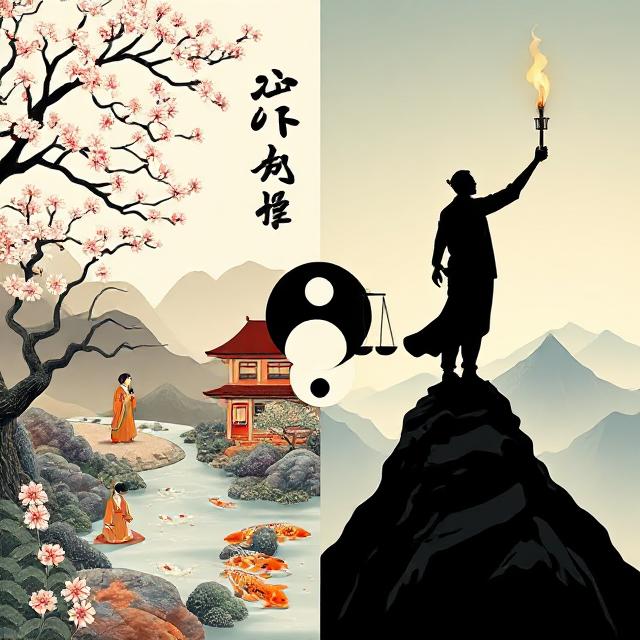
Table of Contents
East’s Focus on Harmony vs West’s Focus on Autonomy: Two Paths of Thought
The philosophical divide between East’s focus on harmony vs West’s focus on autonomy reaches deep into how cultures define the self, construct societies, and envision the good life. At its heart is a question: should individuals strive to fit seamlessly into a whole, or carve out their own distinct paths? This article explores the foundations, expressions, and consequences of these contrasting worldviews, stretching from Confucian China to Enlightenment Europe.
I. The Eastern Ethos of Harmony
A. Harmony as a Moral Ideal
In much of Eastern thought, harmony (he in Chinese, wa in Japanese) is not merely a social tactic—it is a moral end. Influenced by Confucianism, Taoism, and Buddhism, Eastern philosophy values the integration of the self with family, society, and nature.
B. Confucianism and Social Roles
Confucian ethics centers on relational duties:
- Filial piety (respect for parents)
- Ritual propriety (li)
- Humaneness (ren) The self is understood through its roles: child, sibling, citizen, ruler. Harmony arises from fulfilling these roles properly.
C. Taoism: Flow, Not Force
Taoism adds a mystical dimension. Rather than assert the will, one should align with the Tao (the Way). Through wu wei (non-striving), the sage lives in balance with natural rhythms.
D. Buddhism: The Middle Way
Buddhist ethics avoids extremes. Harmony comes through the Eightfold Path, avoiding both hedonism and asceticism. The goal is to overcome the illusion of a separate self.
E. Community Over Individual
Eastern societies, shaped by these traditions, tend to prioritize collective well-being. Decision-making often considers family, ancestors, and community over individual rights.
II. The Western Ethos of Autonomy
A. Autonomy as a Philosophical Pillar
From ancient Greece to Enlightenment Europe, Western thought has championed autonomy—the ability of the rational individual to govern oneself.
B. Greek Roots: The Rational Agent
Plato and Aristotle saw the good life as one governed by reason. While social roles mattered, human excellence (arete) came from inner cultivation and moral reasoning.
C. Christianity and the Soul
Christianity emphasized the unique value of each soul before God. This individual moral worth laid groundwork for later ideas of conscience and moral agency.
D. Enlightenment: Autonomy as Freedom
Philosophers like Kant and Locke placed autonomy at the center:
- Kant: Morality is acting from one’s rational will, not external pressures.
- Locke: Rights come from nature, and each individual is sovereign. This led to modern ideas of human rights, personal liberty, and democracy.
E. The Autonomous Self
In Western modernity, identity often means discovering or asserting one’s unique individuality. Success is personal, not communal. Expression trumps conformity.
III. Comparative Table: Harmony vs Autonomy
| Dimension | Eastern Harmony | Western Autonomy |
|---|---|---|
| Self-Identity | Defined through relationships | Defined through inner self and reason |
| Moral Ideal | Balance, respect, duty | Freedom, authenticity, moral independence |
| Social Structure | Hierarchical and interdependent | Egalitarian and rights-based |
| Decision-Making | Consensus, social context | Individual choice and consent |
| Education Goal | Moral character through tradition | Critical thinking and self-expression |
IV. Psychological and Ethical Implications
A. The Relational vs Individual Self
- Eastern self: fluid, context-dependent, interwoven with others
- Western self: fixed, internally coherent, self-owned
B. Ethical Consequences
- Harmony ethics stress obligation: duty to family, elders, nation
- Autonomy ethics stress rights: the individual must be protected from intrusion
Each model has strengths and weaknesses:
- Harmony can suppress dissent or creativity
- Autonomy can lead to alienation or moral relativism
V. Modern Intersections
A. Globalization and Blending
Today, the boundaries blur:
- Western mindfulness borrows from Eastern harmony
- Eastern democracies adopt Western autonomy
People across cultures now live with hybrid identities: part communal, part individual.
B. Business and Politics
- Asian companies often stress team success and seniority
- Western firms prioritize innovation and individual performance
Diplomacy and international policy also reflect these values.
C. Education and Parenting
- Eastern: obedience, respect, excellence through discipline
- Western: curiosity, independence, and emotional validation
VI. Toward Integration: Can We Balance Both?
The tension between harmony and autonomy mirrors a deeper truth: humans need both connection and freedom.
- Too much harmony, and the soul may stagnate
- Too much autonomy, and society may fracture
Philosophers, educators, and spiritual teachers increasingly seek dialectical ethics:
- Teach students both debate and respect
- Encourage self-discovery and communal responsibility
- Promote policies that protect liberty while nurturing belonging
VII. Conclusion: East’s Harmony vs West’s Autonomy
The conversation between East’s focus on harmony vs West’s focus on autonomy is not about superiority but balance. Both traditions offer deep insight into what it means to live well.
Harmony reminds us we are part of a whole. Autonomy reminds us we must choose our path.
Together, they outline a global philosophy for a connected yet free humanity.